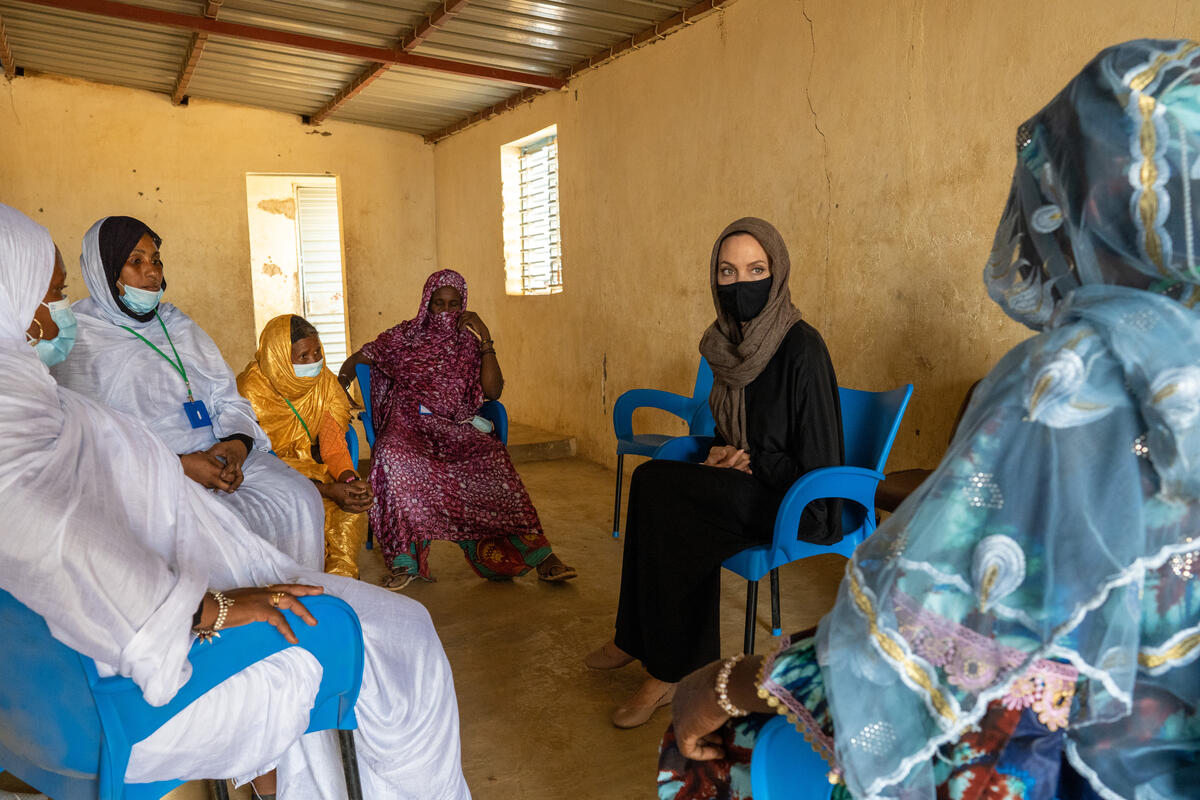Angelina Jolie and UNHCR chief Guterres visit boat people on Italian island
Angelina Jolie and UNHCR chief Guterres visit boat people on Italian island

LAMPEDUSA ISLAND, Italy, June 19 (UNHCR) - Goodwill Ambassador Angelina Jolie and UNHCR chief António Guterres met boat people, including unaccompanied minors, on a tiny Italian island on Sunday and remembered those who have lost their lives trying to reach Lampedusa by sea from Africa.
Jolie and Guterres visited the Porta d'Europa - a stone gateway on a headland next to the sea where hundreds of boats have arrived with migrants from North Africa, including refugees and asylum-seekers. More than 40,000 people have risked the Mediterranean crossing on overcrowded boats and reached Lampedusa so far this year. A further 1,500 have died in the attempt.
Guterres appealed on European countries to accept the people coming from Africa, especially those fleeing violence in Libya. "When we have so many conflicts at the gates of Europe, the most important thing a country can do is keep their borders open," he stressed, while mentioning Italy by name.
The High Commissioner noted that about 18,000 people, including refugees, had reached Lampedusa by boat to date from Libya, while adding that this represented only 2 per cent of the people who had left Libya since conflict erupted there in February.
Jolie, who earlier in the day meet asylum-seekers at two locations in Malta, said she was moved to be at the Porta d'Europa. "It was very moving to stand with the mayor, the priest and the people of Lampedusa at this place, to take a moment of silence while a wreath was laid on a submerged boat on which three people had lost their lives.
"When I think of these people, these families, I try to imagine what would bring someone - for example a mother with children - to make this journey. What kind of a life she must have lived, what she must have suffered, to be brought to a point where her last resort is to step onto an overcrowded rickety boat," Jolie said.
"What must her life be like that the best alternative is to risk drowning and suffocation . . . only to be brought to a new country where she may be turned away. Sent back to sea," she said, adding: "Very few of us here today can even begin to understand what kind of painful existence she must have led."
The award-winning actress and Guterres also both thanked the Italian coastguard for saving many people who were on sinking boats. Jolie had earlier Friday in Valletta praised coastguards in Malta for having "saved thousands of lives over the years" and urged that they receive support from the international community to handle the inflow of migrants by sea.
The VIP visitors also saw reception facilities on Lampedusa and met with unaccompanied minors as well as some new arrivals. Italy has moved most of the boat people to the mainland, but some have been returned to Tunisia. Most of the arrivals have been economic migrants, especially from Tunisia, but some are people in need of international protection, including refugees from sub-Saharan Africa and Libya.
Guterres said it was important that arrivals be moved from the crowded conditions of Lampedusa as soon as possible. He also noted that among those coming to Italy, "there are some people who are becoming a refugee for the second time."
Meanwhile, he spoke against proposals that Italy revive a policy of pushing back to Africa boats carrying migrants. "My position is clear, it's not possible to send people back to a civil war situation."
Before joining High Commissioner Guterres in Lampedusa, Jolie had visited Malta, which has also been a destination for people fleeing North Africa by boat. She visited Lyster Barracks, a former Royal Air Force facility and now a detention centre for asylum-seekers, many of whom have fled the violence in Libya. They include Somalis, Ethiopians and others from sub-Saharan Africa.
"Malta has saved many lives, but it is the daily conditions on the ground that are of most concern," Jolie said in Malta on Sunday morning. "We've spent time today speaking with the government and will spend more time talking about how, together, we can make the conditions more humane, especially for the children.
"We've spoken about our shared concerns about making sure asylum claims are processed as quickly as possible so no-one is sitting in a prison-like situation and waiting on a decision about their status," she added.
Many of the people Jolie met in the barracks told her that they had been working in Libya to make money to remit to their families back home. One man referred to Libya as the heart of Africa, where they were able to work. "Now it is on fire and Africa is crying," he said.
The people said they had never attempted to come to Europe before, they just wanted a place where they were safe and could work. "They are not asking to go to any particular country, they just want to find safety to work, and to have freedom," Jolie stressed.
The Goodwill Ambassador also visited an open centre near Malta's main airport where vulnerable asylum-seekers are living in tents inside an old aircraft hangar. The people she met there said living conditions were difficult.
By Ariane Rummery and Melissa Fleming
on Lampedusa Island, Italy









